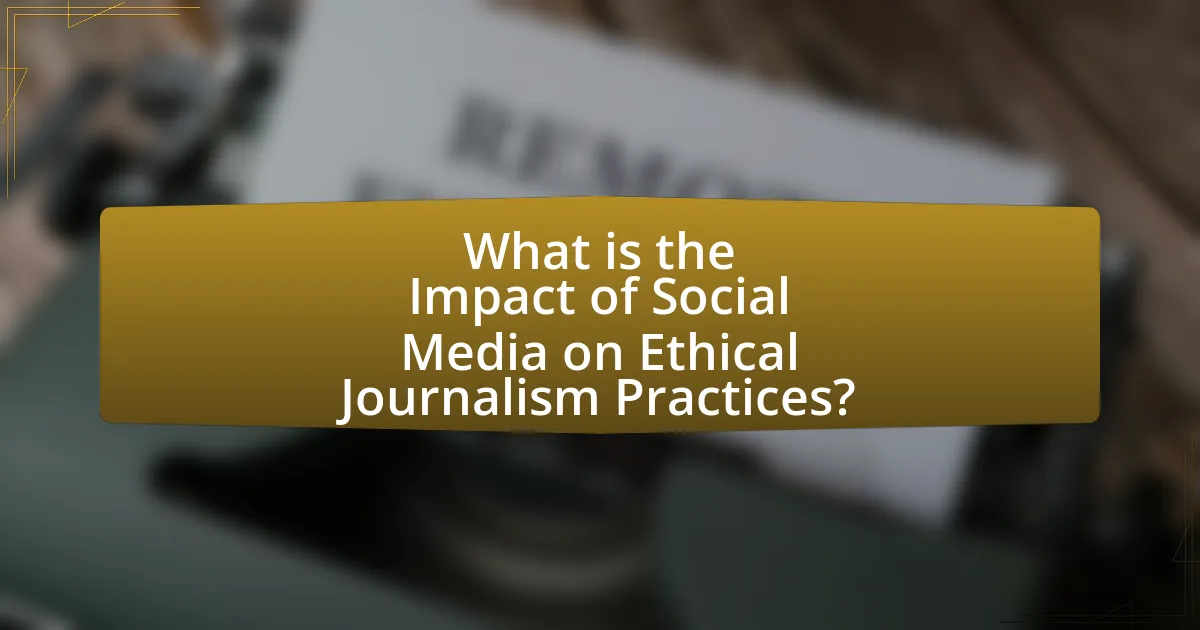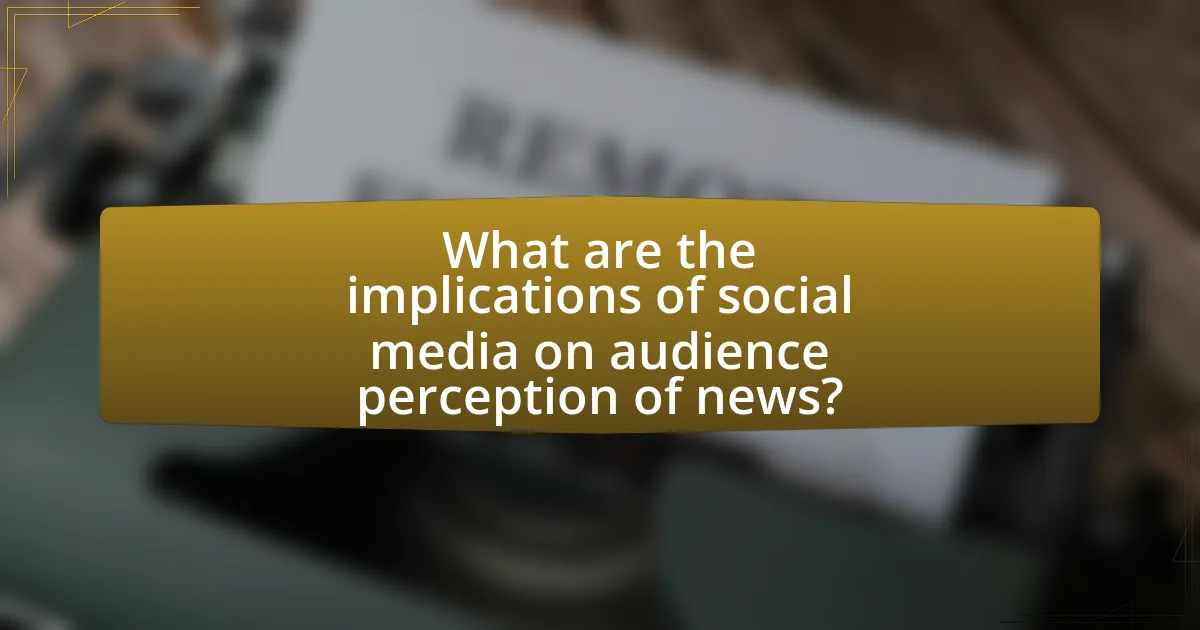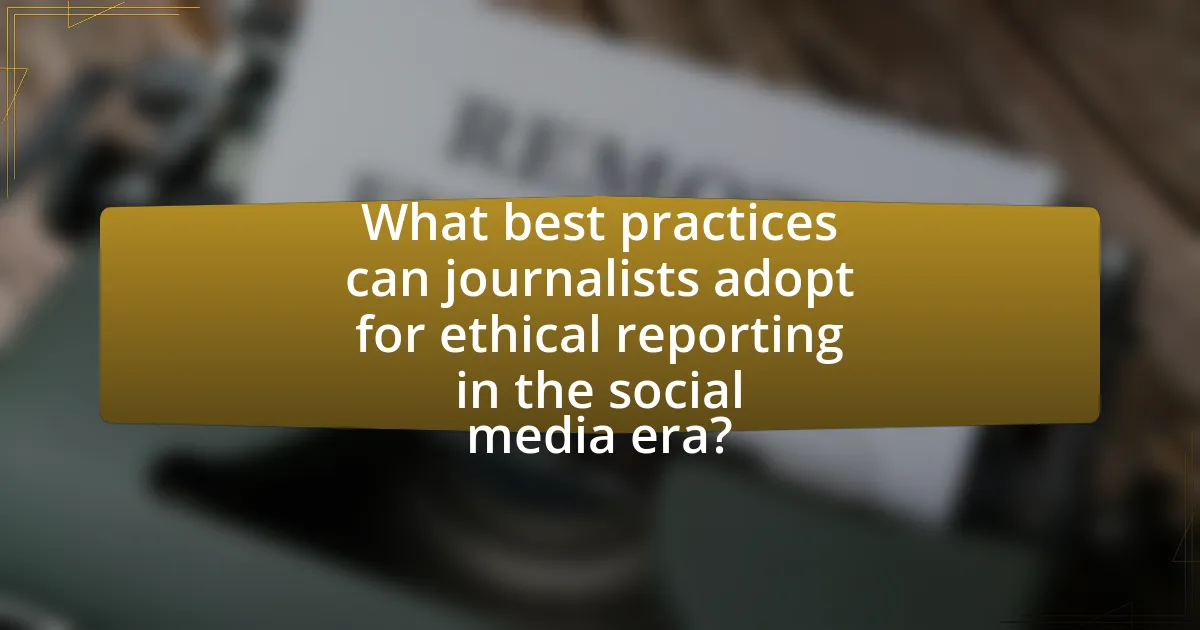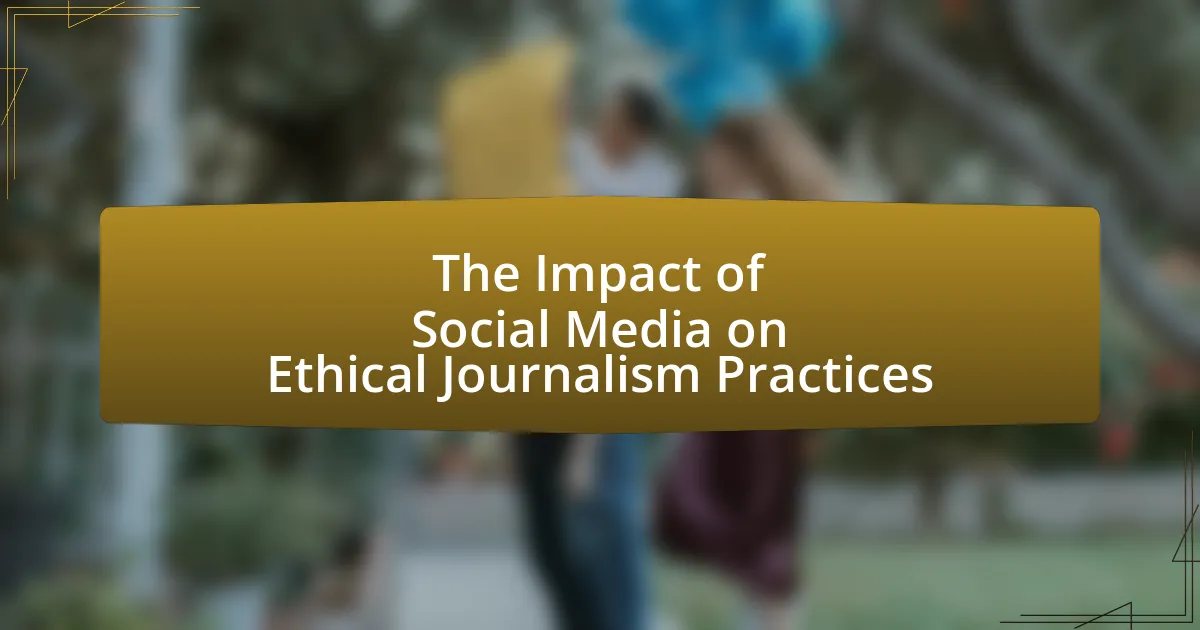The article examines the impact of social media on ethical journalism practices, highlighting how the rapid dissemination of information can blur the lines between professional journalism and user-generated content. It discusses the challenges journalists face, such as the spread of misinformation, audience expectations for speed over accuracy, and the erosion of journalistic standards. Key topics include the transformation of news dissemination, the influence of social media on audience engagement, and the ethical dilemmas that arise from the use of user-generated content. The article emphasizes the importance of maintaining ethical standards to uphold journalistic integrity in an era dominated by social media.

What is the Impact of Social Media on Ethical Journalism Practices?
Social media significantly impacts ethical journalism practices by accelerating the dissemination of information and blurring the lines between professional journalism and user-generated content. This rapid spread can lead to the propagation of misinformation, as journalists may feel pressured to publish quickly without thorough fact-checking. A study by the Pew Research Center in 2021 found that 53% of U.S. adults reported encountering false information on social media, highlighting the challenge journalists face in maintaining accuracy and credibility. Furthermore, the rise of social media has shifted audience expectations, with many consumers prioritizing speed over accuracy, which can compromise journalistic integrity.
How has social media transformed the landscape of journalism?
Social media has transformed the landscape of journalism by enabling real-time news dissemination and fostering direct engagement between journalists and audiences. This shift allows journalists to share breaking news instantly, reaching a global audience without traditional gatekeeping. For instance, during the Arab Spring, social media platforms like Twitter and Facebook played crucial roles in reporting events as they unfolded, often outpacing traditional news outlets. Additionally, social media has democratized information sharing, allowing citizen journalism to flourish, where individuals can report news from their perspectives, further diversifying the narrative landscape. This transformation has also raised ethical challenges, such as the spread of misinformation and the need for journalists to verify sources more rigorously in a fast-paced environment.
What are the key changes in news dissemination due to social media?
Social media has fundamentally transformed news dissemination by enabling real-time sharing, increasing audience engagement, and democratizing content creation. Traditional news outlets have shifted from being the sole gatekeepers of information to competing with user-generated content on platforms like Twitter and Facebook. According to a Pew Research Center study, 62% of adults in the U.S. get news from social media, highlighting the shift in how audiences consume information. Additionally, social media allows for immediate feedback and interaction, which can influence news narratives and reporting practices. This shift has raised ethical concerns regarding misinformation and the responsibility of journalists to verify sources in a fast-paced environment.
How do social media platforms influence audience engagement with news?
Social media platforms significantly influence audience engagement with news by facilitating real-time interaction and content sharing. These platforms enable users to comment, like, and share news articles, which increases visibility and encourages discussions among audiences. According to a Pew Research Center study, 62% of adults in the U.S. get news from social media, highlighting its role in shaping public discourse. Additionally, algorithms on platforms like Facebook and Twitter prioritize content based on user engagement, further amplifying popular news stories and shaping audience perceptions. This dynamic creates a feedback loop where audience reactions can influence news coverage and journalistic practices.
What ethical challenges arise from the use of social media in journalism?
The ethical challenges arising from the use of social media in journalism include misinformation, lack of accountability, and erosion of journalistic standards. Misinformation can spread rapidly on social media platforms, leading to the dissemination of false information, which undermines public trust in journalism. A study by the Pew Research Center found that 64% of Americans believe that fabricated news stories cause confusion about the basic facts of current events. Additionally, the anonymity and lack of editorial oversight on social media can result in journalists not being held accountable for their reporting, which can lead to ethical lapses. Furthermore, the pressure to produce content quickly for social media can compromise the thoroughness and accuracy of reporting, ultimately eroding established journalistic standards.
How does the speed of information sharing affect journalistic integrity?
The speed of information sharing significantly undermines journalistic integrity by increasing the likelihood of disseminating unverified or inaccurate information. Rapid news cycles pressure journalists to prioritize speed over accuracy, leading to potential errors and misinformation. For instance, a study by the Pew Research Center found that 62% of social media users have encountered news that they later discovered was inaccurate, highlighting the risks associated with fast-paced information dissemination. This urgency can compromise fact-checking processes, ultimately eroding public trust in media outlets and diminishing the overall quality of journalism.
What role does misinformation play in ethical journalism practices?
Misinformation undermines ethical journalism practices by eroding trust and credibility in news sources. When journalists disseminate false or misleading information, it compromises their responsibility to provide accurate reporting, which is foundational to ethical standards in journalism. A study by the Pew Research Center found that 64% of Americans believe that fabricated news stories cause confusion about basic facts, highlighting the detrimental impact of misinformation on public perception. This erosion of trust can lead to a disengaged audience, further complicating the journalist’s role in informing the public accurately and responsibly.
Why is it important to maintain ethical standards in journalism amidst social media influence?
Maintaining ethical standards in journalism amidst social media influence is crucial to ensure the accuracy and credibility of information. Ethical journalism fosters trust between the media and the public, which is essential in an era where misinformation can spread rapidly through social platforms. According to a 2021 Pew Research Center study, 64% of Americans believe that social media has a mostly negative effect on the way news is reported, highlighting the need for journalists to adhere to ethical guidelines to combat false narratives. Upholding these standards helps journalists distinguish between credible sources and unreliable information, ultimately protecting the integrity of the news industry.
How do ethical standards protect journalistic credibility?
Ethical standards protect journalistic credibility by establishing guidelines that promote accuracy, fairness, and accountability in reporting. These standards ensure that journalists verify information before publication, which reduces the risk of disseminating false or misleading content. For instance, adherence to the Society of Professional Journalists’ Code of Ethics emphasizes the importance of seeking truth and reporting it, which directly supports the credibility of news organizations. Furthermore, ethical standards foster public trust by holding journalists accountable for their work, as seen in cases where breaches of ethics lead to disciplinary actions or loss of reputation. This accountability reinforces the expectation that journalists will act responsibly, thereby enhancing their credibility in the eyes of the audience.
What are the consequences of failing to uphold ethical journalism in the age of social media?
Failing to uphold ethical journalism in the age of social media leads to misinformation, erosion of public trust, and potential harm to individuals and communities. Misinformation spreads rapidly on social media platforms, as seen during events like the COVID-19 pandemic, where false information about the virus and vaccines proliferated, causing public health risks. The erosion of public trust is evident in surveys indicating that a significant portion of the population views media as biased or unreliable, which undermines the credibility of legitimate news sources. Additionally, unethical journalism can result in defamation or harm to individuals, as seen in cases where false narratives have led to real-world consequences, such as harassment or violence against targeted individuals.
How can journalists navigate the challenges posed by social media?
Journalists can navigate the challenges posed by social media by implementing rigorous fact-checking protocols and maintaining transparency in their reporting. Fact-checking helps to counter misinformation, which is prevalent on social media platforms; for instance, a study by the Pew Research Center found that 64% of Americans believe that fabricated news stories cause confusion about the basic facts of current events. Additionally, transparency in sourcing and methodology builds trust with audiences, as evidenced by a 2020 report from the Reuters Institute for the Study of Journalism, which indicated that audiences are more likely to trust news organizations that openly share their processes. By prioritizing these practices, journalists can effectively address the complexities introduced by social media while upholding ethical standards.
What strategies can journalists employ to verify information shared on social media?
Journalists can employ several strategies to verify information shared on social media, including cross-referencing sources, utilizing fact-checking tools, and assessing the credibility of the original poster. Cross-referencing involves checking the information against reputable news outlets or official statements to confirm its accuracy. Fact-checking tools, such as Snopes or FactCheck.org, provide resources to validate claims and debunk misinformation. Additionally, assessing the credibility of the original poster, including their background and previous posts, helps determine the reliability of the information. These strategies are essential in combating the spread of false information, as studies show that misinformation can significantly influence public perception and decision-making.
How can journalists balance speed and accuracy in reporting on social media?
Journalists can balance speed and accuracy in reporting on social media by implementing a structured verification process before publishing information. This involves cross-referencing multiple credible sources, utilizing fact-checking tools, and prioritizing information from established news organizations. For instance, a study by the Pew Research Center found that 64% of journalists use social media to verify information, indicating that a systematic approach can enhance both the speed of reporting and the accuracy of the content shared. By adopting these practices, journalists can ensure timely updates while maintaining the integrity of their reporting.

What are the implications of social media on audience perception of news?
Social media significantly alters audience perception of news by prioritizing speed and engagement over accuracy and depth. This shift leads to the spread of misinformation, as users often share sensationalized or unverified content without critical evaluation. A study by the Pew Research Center found that 62% of Americans get their news from social media, highlighting its role in shaping public opinion. Furthermore, algorithms on platforms like Facebook and Twitter tend to amplify content that generates strong emotional reactions, which can distort the audience’s understanding of important issues. This environment fosters echo chambers, where users are exposed primarily to viewpoints that reinforce their existing beliefs, further skewing their perception of news.
How does social media shape public trust in journalism?
Social media significantly shapes public trust in journalism by influencing the dissemination and perception of news. The rapid sharing of information on platforms like Twitter and Facebook allows users to access diverse viewpoints, but it also leads to the spread of misinformation, which can erode trust in traditional news sources. A study by the Pew Research Center found that 64% of Americans believe that social media has a mostly negative effect on the way news is reported, highlighting concerns about accuracy and reliability. Furthermore, the algorithms used by social media platforms often prioritize sensational content, which can skew public perception and further diminish trust in journalistic integrity.
What factors contribute to audience skepticism towards news on social media?
Audience skepticism towards news on social media is primarily driven by misinformation, lack of credibility, and algorithmic bias. Misinformation spreads rapidly on social platforms, leading users to question the accuracy of news content. A study by the Pew Research Center found that 64% of Americans believe that fabricated news stories cause confusion about basic facts. Additionally, the perceived lack of credibility stems from the absence of traditional journalistic standards, as many social media posts are not fact-checked. Furthermore, algorithmic bias can create echo chambers, reinforcing existing beliefs and making users more skeptical of opposing viewpoints. This combination of factors significantly undermines trust in news disseminated through social media channels.
How can journalists rebuild trust with audiences in a social media-driven environment?
Journalists can rebuild trust with audiences in a social media-driven environment by prioritizing transparency and accountability in their reporting. This involves clearly disclosing sources, methodologies, and potential biases, which fosters a sense of honesty and integrity. Research indicates that 86% of people believe transparency is crucial for trust in media (Edelman Trust Barometer, 2021). Additionally, engaging directly with audiences through social media platforms allows journalists to address concerns, clarify misinformation, and create a dialogue, further enhancing credibility. By consistently demonstrating ethical practices and responsiveness, journalists can effectively restore and strengthen audience trust.
What role does user-generated content play in ethical journalism?
User-generated content (UGC) plays a significant role in ethical journalism by enhancing the diversity of perspectives and providing real-time information from the public. This inclusion of UGC allows journalists to access firsthand accounts and images during breaking news events, which can lead to more comprehensive and accurate reporting. For instance, during the Arab Spring, social media platforms were flooded with UGC that documented protests and government responses, offering insights that traditional media outlets could not capture in real-time. However, ethical journalism requires that journalists verify the authenticity of UGC to avoid misinformation, as seen in cases where manipulated images were circulated during crises. Thus, while UGC enriches journalistic narratives, it also imposes a responsibility on journalists to uphold standards of accuracy and verification.
How can journalists ethically incorporate user-generated content into their reporting?
Journalists can ethically incorporate user-generated content into their reporting by verifying the authenticity of the content and ensuring proper attribution to the original creators. Verification involves fact-checking the source and context of the user-generated material to prevent the spread of misinformation, as highlighted by the 2020 Reuters Institute report, which emphasizes the importance of accuracy in journalism. Proper attribution not only respects the rights of content creators but also enhances transparency, fostering trust with the audience. By adhering to these practices, journalists can responsibly utilize user-generated content while maintaining ethical standards in their reporting.
What are the risks associated with relying on user-generated content?
Relying on user-generated content poses several risks, including misinformation, lack of credibility, and potential legal issues. Misinformation can spread rapidly through social media platforms, leading to the dissemination of false narratives, as evidenced by studies showing that false information is 70% more likely to be retweeted than true information. The lack of credibility arises because user-generated content often lacks verification, making it difficult for journalists to ascertain the reliability of the sources. Additionally, legal issues can arise from copyright infringement or defamation claims, as user-generated content may not always respect intellectual property rights or may contain harmful statements about individuals or organizations. These risks highlight the challenges journalists face when integrating user-generated content into their reporting practices.

What best practices can journalists adopt for ethical reporting in the social media era?
Journalists can adopt several best practices for ethical reporting in the social media era, including verifying information before publication, maintaining transparency with audiences, and respecting privacy. Verifying information involves cross-checking facts from multiple reliable sources to prevent the spread of misinformation, which is crucial given the rapid dissemination of news on social media platforms. Transparency can be achieved by clearly disclosing sources and methods, allowing audiences to understand the context of the reporting. Respecting privacy means being mindful of the personal information of individuals involved in stories, especially in sensitive situations, to uphold ethical standards. These practices are essential for maintaining credibility and trust in journalism, particularly as social media continues to influence public perception and information consumption.
How can journalists ensure accuracy in their reporting when using social media?
Journalists can ensure accuracy in their reporting when using social media by verifying information through multiple credible sources before publication. This practice is essential because social media can spread misinformation rapidly; for instance, a 2020 study by the Pew Research Center found that 64% of Americans believe that social media platforms have a significant role in the spread of false information. By cross-referencing facts with established news organizations, official statements, and expert opinions, journalists can mitigate the risk of disseminating inaccurate information. Additionally, employing fact-checking tools and collaborating with fact-checking organizations can further enhance the reliability of the information being reported.
What tools and resources are available for fact-checking information from social media?
Tools and resources available for fact-checking information from social media include platforms like Snopes, FactCheck.org, and PolitiFact, which specialize in verifying claims and debunking misinformation. These organizations utilize a systematic approach to assess the accuracy of information by cross-referencing sources, analyzing evidence, and providing context. Additionally, browser extensions such as NewsGuard and the Chrome extension for fact-checking can help users identify credible news sources and flag potentially misleading content. Research indicates that using these tools can significantly reduce the spread of false information, as they provide users with reliable data and context to evaluate claims critically.
How can journalists effectively communicate their ethical standards to their audience?
Journalists can effectively communicate their ethical standards to their audience by clearly articulating their principles through transparency and consistent messaging. By publishing codes of ethics on their platforms, journalists provide a reference point for their audience, fostering trust and accountability. For instance, the Society of Professional Journalists outlines ethical guidelines that can be shared widely, reinforcing the commitment to accuracy, fairness, and independence. Additionally, engaging with the audience through social media allows journalists to explain their decision-making processes and respond to inquiries, further clarifying their ethical stance. This approach not only informs the audience but also invites dialogue, enhancing public understanding of journalistic integrity.
What are the future trends in ethical journalism influenced by social media?
Future trends in ethical journalism influenced by social media include increased transparency, enhanced audience engagement, and a focus on fact-checking. As social media platforms evolve, journalists are expected to adopt more transparent practices, such as openly sharing sources and methodologies, to build trust with audiences. Enhanced audience engagement will involve interactive storytelling and real-time feedback, allowing journalists to better understand public concerns and interests. Additionally, the rise of misinformation on social media has led to a stronger emphasis on fact-checking, with journalists prioritizing accuracy and verification to combat false narratives. These trends reflect the ongoing adaptation of ethical journalism to the challenges and opportunities presented by social media.
How might emerging technologies impact ethical journalism practices?
Emerging technologies significantly impact ethical journalism practices by introducing new tools and platforms that can enhance or compromise journalistic integrity. For instance, the rise of artificial intelligence in newsrooms allows for faster content generation and data analysis, but it also raises concerns about misinformation and bias in automated reporting. A study by the Pew Research Center in 2021 found that 64% of Americans believe that social media has a mostly negative effect on the way news is reported, highlighting the ethical dilemmas journalists face in verifying information shared on these platforms. Additionally, the use of social media for news dissemination can blur the lines between professional journalism and citizen reporting, complicating accountability and fact-checking processes.
What role will social media play in shaping the future of news reporting?
Social media will play a pivotal role in shaping the future of news reporting by facilitating real-time information dissemination and audience engagement. Platforms like Twitter and Facebook enable journalists to share breaking news instantly, reaching a global audience and allowing for immediate feedback. According to a Pew Research Center study, 62% of Americans get news from social media, highlighting its influence on public information consumption. Furthermore, social media encourages diverse voices and perspectives, which can enhance journalistic integrity by promoting transparency and accountability. This shift towards digital platforms necessitates that news organizations adapt their ethical practices to address challenges such as misinformation and the need for fact-checking, ensuring that the quality of reporting remains high in an increasingly fast-paced environment.
What practical tips can journalists follow to maintain ethical standards in social media reporting?
Journalists can maintain ethical standards in social media reporting by verifying information before sharing it. This involves cross-checking facts with reliable sources to prevent the spread of misinformation, which is crucial given that 59% of social media users encounter false information regularly. Additionally, journalists should disclose their sources when possible, ensuring transparency and accountability in their reporting. They must also respect privacy and avoid sharing sensitive information without consent, as ethical guidelines emphasize the importance of protecting individuals’ rights. Lastly, journalists should engage with their audience responsibly, correcting any errors promptly to uphold credibility and trust.

Leave a Reply